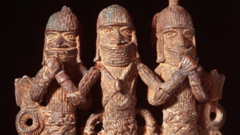The Dutch government announced plans to return 119 Benin Bronzes, artifacts plundered during the British invasion of Benin City in 1897, to Nigeria. This move marks a significant moment for cultural repatriation and could influence other institutions, including the British Museum, facing similar pressures regarding colonial-era artifacts.
Netherlands Commits to Repatriate Benin Bronzes to Nigeria

Netherlands Commits to Repatriate Benin Bronzes to Nigeria
A historic agreement will see over 100 stolen Benin Bronzes returned to Nigeria, igniting renewed discussions around cultural restitution and colonial legacies.
The Netherlands is poised to make a significant cultural gesture by returning more than 100 Benin Bronzes—artifacts that were looted from Nigeria by British troops during a violent colonial campaign in the late 19th Century. The repatriation involves 119 artifacts currently held at the Wereldmuseum, showcasing the ongoing dialogue surrounding the restitution of cultural treasures taken during colonial times.
The term "Benin Bronzes" refers not only to sculptures made of bronze but also includes various forms of art such as ivory masks, tusks, and figures of historical figures from the Benin Kingdom, created between the 15th and 19th centuries. This will be the largest repatriation of these antiquities to date, marking a notable achievement for Nigeria's National Commission for Museums and Monuments (NCMM) under the stewardship of director-general Olugbile Holloway. In an effort to learn from this historic injustice, the Dutch Minister of Culture, Education, and Science Eppo Bruins articulated that the return of the artifacts represents a step towards rectifying colonial wrongs still felt by affected communities today.
The Benin Bronzes are emblematic of the historical trauma that colonialism inflicted on the people of Nigeria, serving as painful reminders for descendants of the ancient Benin kingdom. The return announcement comes at a time when scrutiny of Western institutions, particularly the British Museum, is intensifying. With over 900 Benin artifacts in its collection, calls for their return have intensified, especially as protests highlight the ongoing impact of colonial theft.
As Nigeria prepares to establish the Edo Museum of West African Art in Benin City by 2026—designed by prominent architect Sir David Adjaye, intended to house an extensive collection of these artifacts—the symbolic meaning of the Bronzes continues to resonate deeply. Furthermore, this renewed commitment from the Netherlands may serve as a catalyst for other institutions grappling with the legacy of colonialism and the ethical questions surrounding the ownership of cultural heritage.



















